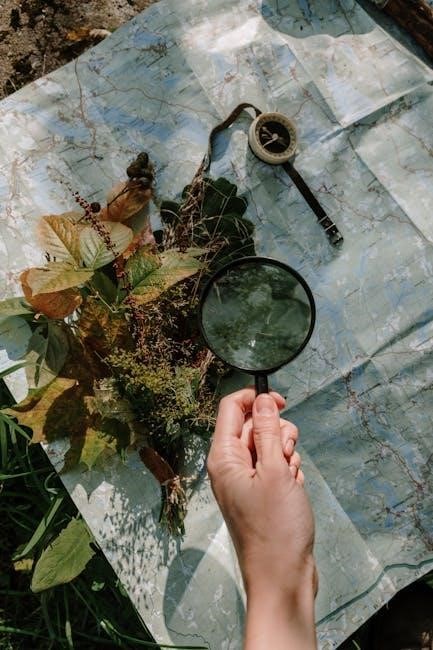Becoming a Registered Maine Guide is a prestigious certification requiring knowledge, experience, and dedication․ It involves passing challenging written and oral exams, demonstrating expertise in specialized areas like hunting, fishing, or recreation․ The process is managed by the Maine Department of Inland Fisheries and Wildlife, ensuring high standards for guiding professionals․ This certification is highly respected in the outdoor industry, reflecting a commitment to conservation and safety in Maine’s wilderness․
1․1 Overview of the Maine Guide License
The Maine Guide License is a prestigious certification issued by the Maine Department of Inland Fisheries and Wildlife․ It requires passing rigorous written and oral exams, demonstrating expertise in specific areas like hunting, fishing, or recreation․ The license is renewable annually, with requirements including ongoing professional development․ It is a symbol of professionalism and a commitment to safely guiding visitors in Maine’s wilderness․ This certification is highly respected, reflecting a deep understanding of Maine’s natural resources and outdoor traditions․
1․2 Importance of the Maine Guide Certification
The Maine Guide Certification is highly respected, symbolizing expertise and reliability in guiding outdoor activities․ It ensures guides are knowledgeable in safety, conservation, and local regulations, protecting both clients and the environment․ The certification is crucial for building trust with clients and promoting sustainable tourism in Maine’s wilderness․ It also signifies a guide’s commitment to professional standards, enhancing their credibility in the outdoor industry․ This certification is a cornerstone of Maine’s outdoor guiding tradition, fostering responsible exploration of the state’s natural resources․
Understanding the Licensing Classifications
Maine Guide Licenses are categorized into specific types, each requiring specialized knowledge․ Understanding these classifications is essential for guiding effectively in diverse outdoor activities and ensuring compliance with state regulations․
2․1 Types of Maine Guide Licenses
Maine Guide Licenses are categorized into specific types, each requiring specialized knowledge and skills․ These include hunting, fishing, and recreation guides, among others․ Hunting guides must demonstrate expertise in tracking, wildlife behavior, and hunting regulations․ Fishing guides need in-depth knowledge of waterways, fish species, and angling techniques․ Recreation guides focus on activities like hiking, camping, and canoeing, ensuring safety and environmental awareness․ Each classification demands a deep understanding of Maine’s unique ecosystems and adherence to state regulations, ensuring guides provide safe, ethical, and enjoyable experiences for clients․
2․2 Specializations Within the Guide License
Specializations within the Maine Guide License allow individuals to focus on specific areas, enhancing expertise․ These include freshwater fishing, saltwater fishing, hunting, and whitewater rafting․ Freshwater fishing guides must know local fish species, habitats, and fishing techniques․ Hunting guides need expertise in game tracking, hunting laws, and safety․ Whitewater guides must master river navigation and safety protocols․ Each specialization requires passing exams tailored to the field, ensuring guides are well-versed in their area, providing clients with informed, safe, and enjoyable experiences in Maine’s diverse outdoor settings․

Meeting the Basic Requirements
To become a Maine Guide, applicants must meet residency, age, and background check requirements․ They must also complete a fingerprinting process and provide proof of first aid certification․
3․1 Residency Requirements
Becoming a Registered Maine Guide requires applicants to meet specific residency criteria․ Candidates must be residents of Maine, defined as living in the state for at least one year prior to applying․ This ensures deep familiarity with Maine’s terrain, wildlife, and ecosystems․ Residency is verified through documentation such as driver’s licenses, voter registration, or property tax records․ This requirement helps maintain the integrity and local expertise of Maine Guides, ensuring they can provide authentic and safe experiences for clients in Maine’s wilderness․
3․2 Age and Background Check Requirements
To become a Registered Maine Guide, applicants must meet specific age and background criteria․ The minimum age is 18 years old․ A mandatory background check is required, ensuring applicants have a clean record․ This involves fingerprinting through an approved service like IdentGO, where applicants must select the “Maine Inland Fisheries and Wildlife Guide License” option․ The background check verifies suitability for guiding responsibilities, ensuring safety and trustworthiness for clients․ This step is crucial in maintaining the professionalism and integrity of Maine Guides in their specialized roles․
The Licensing Process
Becoming a Maine Guide involves obtaining an application, completing a background check, submitting the form with fees, and preparing for exams to demonstrate expertise and professionalism․
4․1 Obtaining the Maine Guide Application
To initiate the process, applicants must obtain the Maine Guide application form․ This can be done by visiting the official website of the Maine Department of Inland Fisheries and Wildlife or by contacting their office directly․ The application is straightforward but requires careful completion to avoid delays․ Ensure all sections are filled accurately, as incomplete forms may result in processing hold-ups․ Once completed, the application must be signed and submitted along with the required fee and any supporting documents․
4․2 Completing the Background Check
Applicants must complete a mandatory background check before submitting their application․ To initiate this, visit IdentGO or call 1-855-667-7422 to schedule an appointment․ Select “Maine Inland Fisheries and Wildlife Guide License” when prompted․ Follow the instructions to complete the fingerprinting process, which is essential for the background check․ Ensure all steps are followed accurately to avoid delays․ This process is a critical step in the licensing procedure, ensuring the integrity and qualifications of prospective guides․
4․3 Submitting the Application and Fee
Once the background check is completed, applicants must submit the guide license application along with the required fee of $135․00․ The application must be fully completed, with the first page signed․ Current first aid certification is not required for renewals but may be needed for new applicants․ Ensure all documents and fees are sent to the address listed on the application․ Incomplete applications will be returned unprocessed, delaying the licensing process․ Accurate submission is crucial for timely approval․
4․4 Scheduling and Preparing for the Examination
After submitting the application, applicants must schedule their exams with the Maine Department of Inland Fisheries and Wildlife․ A $100 fee is required for each classification being tested․ Exams are typically held in Augusta at the IF&W facility or a nearby state office․ Prepare thoroughly by reviewing wildlife laws, conservation practices, and guiding skills․ Study materials and practical experience are essential for success․ Candidates who fail must notify the Licensing Division before retesting․ The rigorous exams ensure only qualified individuals become Registered Maine Guides, upholding the program’s high standards and reputation․

Examination Process
Becoming a Maine Guide requires passing both written and oral exams, each with a minimum score of 70%․ The exams assess knowledge of wildlife, laws, and guiding skills, ensuring only qualified individuals earn certification․
5․1 Written and Oral Exam Details
The Maine Guide exams are rigorous, requiring a score of 70% or higher to pass․ The written exam covers laws, safety, and species-specific knowledge, while the oral exam assesses practical guiding skills and decision-making․ Both exams must be passed for each license classification sought․ Exams are typically held in Augusta, focusing on demonstrating comprehensive knowledge and hands-on expertise in guiding activities; The challenging nature of these exams ensures only highly qualified individuals become Registered Maine Guides, upholding the state’s high standards for outdoor professionals․
5․2 Passing Requirements and Scoring
To become a Registered Maine Guide, candidates must achieve a score of 70% or higher on both the written and oral exams․ These exams are among the toughest in the U․S․, ensuring only highly qualified individuals succeed․ The written exam evaluates knowledge of laws, safety protocols, and species-specific information, while the oral exam assesses practical guiding skills and decision-making; The high passing requirements reflect Maine’s commitment to maintaining excellence in its guide certification program, making the certification highly respected nationwide․

Post-Examination Steps
After passing the exams, candidates receive their Maine Guide License, marking the start of their career․ Regular renewal and ongoing education ensure they remain certified and updated․
6․1 Receiving the Guide License
Upon successfully passing the exams and completing all requirements, candidates are issued their Maine Guide License․ This license is valid for a specific period and must be renewed․ Guides receive a certification that recognizes their expertise in their chosen classification․ The license serves as official proof of their qualifications to lead outdoor activities in Maine․ It is a significant achievement, reflecting their dedication and knowledge of the state’s natural resources․
6․2 Maintaining and Renewing the License
To maintain a Maine Guide License, guides must renew it periodically by submitting the required application and fee․ Current first aid certification is not mandatory for renewal, but staying updated on safety practices is recommended; Guides are expected to adhere to all state regulations and ethical standards․ Renewal ensures continued recognition of their expertise and allows them to legally guide outdoor activities in Maine․ The process is straightforward, but guides must ensure all submissions are complete and timely to avoid any interruptions in their certification․

Advancing to Master Maine Guide
Master Maine Guide certification requires 10 years of guiding experience, with at least 80 hours annually․ Applicants must submit an affidavit documenting their experience and expertise․
7․1 Experience Requirements for Master Certification
To qualify for Master Maine Guide certification, applicants must demonstrate 10 years of active guiding experience, with a minimum of 80 hours annually․ Experience must be in the specific classification (e․g․, hunting, fishing, or recreation) for which Master status is sought․ Documentation of this experience is required, typically through an affidavit verifying the hours and expertise gained․ This ensures candidates have extensive, hands-on knowledge and skills, solidifying their credentials as highly qualified guides in Maine’s outdoor traditions․
7․2 Applying for Master Maine Guide Status
Applicants for Master Maine Guide certification must submit an affidavit documenting at least 5 years of professional guiding experience within the last 10 years․ The affidavit must detail 240 hours annually, specific to the guide classification sought․ Candidates must also pay the required fee and submit the application to the Maine Department of Inland Fisheries and Wildlife․ This rigorous process ensures only highly experienced and skilled guides achieve Master status, a prestigious milestone in their guiding career․